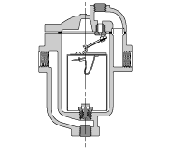

Whenever steam is turned on and off, air will accumulate in the piping and steam equipment. A trap equipped with a thermic bucket will discharge this air 50 to 100 times faster than a standard bucket, reducing warm-up time. Thermic vent buckets are suitable for pressures to 130 psig (9 bar). A large vent hole in the bucket can also solve air-venting problems upon start-up.
Whenever steam is turned on and off, air will accumulate in the
piping and steam equipment. A trap equipped with a thermic bucket will
discharge this air 50 to 100 times faster than a standard bucket,
reducing warm-up time. Thermic vent buckets are suitable for pressures
to 130 psig (9 bar). A large vent hole in the bucket can also solve
air-venting problems upon start-up.
Almost all Armstrong inverted bucket steam traps can be equipped with
internal check valves. A check valve is needed between the trap and the
equipment being drained in the following cases:
Armstrong spring-loaded, stainless steel internal check valves can be
screwed directly into the trap inlet or into an extended inlet tube
having a pipe coupling at the top.:
On 1800 and 2000 Series stainless steel traps, an internal check
valve cannot be installed. Armstrong CVI “in-line check valve will solve
the problem.
In general, a properly selected and installed Armstrong trap will not
freeze as long as steam is coming to the trap. If the steam supply is
shut off, a pop drain should be used to drain the trap automatically.
Maximum Operating Conditions
Pressure: 600 psig (41 bar)
Temperature: 350°F (177°C)
A vacuum will often cause condensate to be retained ahead of a steam
trap. To break a vacuum, air must be introduced into the system by means
of a vacuum breaker.
For maximum protection against freezing and water hammer in heating
coils under modulated control, for example, vacuum breakers are
recommended in conjunction with freeze-protection devices.
Whenever dirt plugs the bucket vent, Armstrong recommends the use of a scrubbing wire to clear the hole on each cycle. Note: On small stainless steel (only) bucket traps, a wiggle wire is installed as standard.
In normal conditions, the inverted bucket trap is not sensitive to
dirt problems (because of its orifice at the top of the trap), unlike
most other traps, which should be installed with a strainer. (See
Armstrong Y-Type Strainers.)
Probe connections are available for trap monitoring on most inverted
bucket traps. Consult your Armstrong Representative for details.
Now you can insulate the in-line traps in your plant without
complicating regular trap maintenance. Insu-Pak, a simple reusable
insulation package, cuts the time and cost of in-field installation
because it goes on in a snap. And it comes off just as easily. The
Insu-Pak can prevent trap freeze-up when used with a properly designed
condensate manifold. Designed for use with Model 2010 and Model 2011
traps.
No PDF available for download.
No PDF available for download.
No PDF available for download.
No PDF available for download.
No PDF available for download.
No PDF available for download.
No PDF available for download.
No PDF available for download.
No PDF available for download.
Copyright © 2025 Campbell-Sevey, Inc.